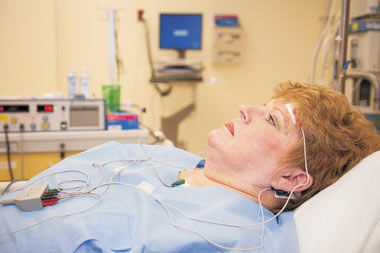Electroconvulsive therapy (ECT) is a procedure used to treat severe depression. It may be used for people who have delusions, hallucinations or suicidal thoughts or when other treatments such as psychotherapy and antidepressant medications have not worked. It is also used for other psychiatric and neurological conditions.
ECT may be recommended for you when:
- You do not improve on anti-depressant medications
- You cannot take anti-depressant medications because of a medical condition
- Your thoughts have become unrealistic
- Your energy level has decreased and you are unable to care for yourself
- You are feeling overwhelmed
- You are feeling extremely suicidal and cannot remain safe
- You cannot wait for anti-depressants to work due to your medical or nutritional status
What ECT Involves
ECT is performed under anesthesia and the patient is asleep. During the procedure, the brain is briefly stimulated with electricity. This causes a small seizure. It is believed that the seizure results in a beneficial change in brain chemistry. ECT has a high success rate in patients with depression.
ECT is given as a series of treatments – usually 6 - 12 treatments over 2 - 4 weeks. General anesthesia is administered by an anesthesiologist and nurse anesthetist. The procedure lasts approximately 10 minutes, with a minimum one hour of recovery time required.
Side effects are primarily associated with anesthesia, but may result from the ECT itself. Because of the effects of anesthesia, you may not remember the procedure. You may experience some short-term memory loss, confusion, nausea, headache, jaw pain, muscle aches and/or soreness immediately following ECT. These effects may last several hours. A few people have reported long-term memory loss.
Electroconvulsive therapy is administered Monday, Tuesday, Wednesday and Friday afternoons at the Pennsylvania Psychiatric Institute’s ECT suite on the 5th floor of the Landis Central Building.
Preparation for ECT includes:
- Nothing to eat after midnight.
- May drink water until 8:00 a.m., nothing to drink after 8:00 a.m.
- An EKG, blood work, recent medical history, physical, and additional medical tests may be required.
- Outpatient ECT will be discharged home on the day of their procedure. Be sure to arrange for transportation to and from the ECT Suite by someone 18 years of age or older.
Referral Process
Physicians who wish to refer a patient for ECT should fax the following information to (717) 782-6461 :
- Patient demographics including: address, phone number, date of birth, social security number and insurance information
- Written medical clearance from the primary care physician or psychiatrist
- Presenting symptoms
- Detailed medical history, physical examination notes, and family history
- Current treatment
- Current medications and previous medication trials
- Current living arrangements
- Chest X-ray ( If 65 or older)
- 12 lead EKG
- CBC, CMP, TSH, T4, urine drug screen, and hepatic profile
Getting Started
For information about electroconvulsive therapy, please contact the ECT Suite at
(717) 782-6422 Monday through Friday.
Directions to Pennsylvania Psychiatric Institute ECT »









